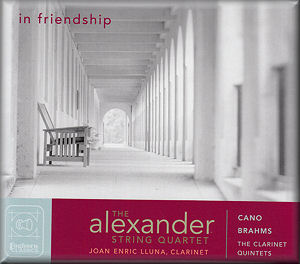 |
 |
| 
Support
us financially by purchasing this disc from: |
|
|
|
|
|
In Friendship
CÚsar CANO (b.1960) Quintet
for Clarinet and Strings, Op.74 (2011) [20:22]
Johannes BRAHMS (1833-1897)
Quintet in B Minor for Clarinet and Strings, Op.115 (1891) [39:10]
Joan Enric Lluna (clarinet)
 The Alexander String Quartet (Zakarias Grafilo, Fred Lifsitz (violins),
Paul Yarbrough (viola), Sandy Wilson (cello))
The Alexander String Quartet (Zakarias Grafilo, Fred Lifsitz (violins),
Paul Yarbrough (viola), Sandy Wilson (cello))
rec. 12-14 July 2011, St. Stephen’s Episcopal Church, Belvedere,
California.
 FOGHORN CLASSICS CD2007 [59:38]
FOGHORN CLASSICS CD2007 [59:38]
|
|
|
The Brahms’ Clarinet Quintet is his masterpiece, and
possibly his most universally loved creation. I’d say that in
any chamber music hit-parade it would make the Top Five. By
the time he wrote it, the composer had reached the peak of communication
directly between his soul and the soul of the listener. The
four movements of the quintet are like a well-filmed movie,
showing intimate and profound feelings as well as both action
and introspection.
As with all great works, this one allows for different readings.
In this performance the first movement does not relax too far,
it retains its inherent energy and that sense of flight. Its
tenderness is muscular, and the yearning is more dramatic than
melancholic. This temperament is somewhat reminiscent of the
first movement of Brahms’ Second Symphony. The development section
is pensive yet wakeful. The clarinet is firm and masculine,
and blends well with the crisp white sound of the Alexander
strings. This more energetic presentation of the first movement
emphasizes the second as a true slow movement: a soft, feline
reverie, with a hushed interplay of shadows and hints. The “gypsy-hued”
middle episode is expressive. The sound of the clarinet is a
shade hard but is not harsh. Its intonations are beautiful and
the transitions between the notes are accurate and even. The
playing is assured and smooth.
The lively third movement is full of Brahms’ signature mood-changes
between smiles and blues. The performance is active and friendly.
It is on the fast side and has a certain cool Mendelssohnian
bustle. The finale is once again full of lyrical yearning. Some
of the variations are dramatic and turbulent; others plaintive
or quietly nostalgic. The theme bears a resemblance to a Slavic
folk song; perhaps the influence of DvorÓk. The players do not
dawdle, but the speed is excessive, and there is the same feeling
of flight as in the first movement. The clarinet avoids foamy
bubbling and the leaps and flourishes are accurate and clean.
By and large, the performance of the entire quintet is cool
and fresh never breathless. The ensemble is carefully balanced.
This music is often described as autumnal, but this
performance has a wintry signature that still conveys
the work’s melancholic beauty.
The Clarinet Quintet of CÚsar Cano comes from a different
world. The first movement, entitled Veiled Proportions,
is quite Bart˛kian. It starts with a slower introduction, and
then picks up tempo and density. The music is poly-rhythmic,
dark and jazzy, with jagged spikes. Although quite modern, it
is never ugly. Reason and logic are there in the fabric. The
second movement, Echoes and Duels, is a lightly galloping
Scherzo, dry and bouncy, with instruments running one after
another and playing in ricochet. Again, I sense the spirit of
Bart˛k, which is supported by the Balkan character of the short
main motif. The music has a serious musical structure, a rich
rhythmic base and a certain “healthy wildness”.
The third movement Oblique Chants is slow and mysterious,
like a night in the jungle. It explores interesting sonic effects
and creates a mesmeric, glistening and throbbing sound-space.
The finale has the title Florid Pulse and is again
driven by sophisticated rhythmic patterns; the booklet mentions
various internal reorganizations of 7/8, 8/8 and 9/8 meters.
This is not an empty-headed, garrulous finale, but a serious,
multi-layered movement with tension and drive. The music is
energetic, with gradually increasing speed and tension, rolling
forward to a final stretch of happy running.
Overall, this Cano quintet leaves the impression of a very well
made contemporary work and I was impressed by its musicality.
The calculations are careful and the theoretical “technology”
employed by the composer does not obtrude or compromise things
at an emotional level. Not a single minute of the work is boring.
The performance flows as in the Brahms and the feeling of empathy
between clarinetist and string players is striking. The blend
and the balance are perfect.
The album is called In Friendship, and the booklet
asserts that the best works for clarinet and strings, those
by Mozart, Weber, Brahms and Nielsen, were created when the
inspirational clarinetist was the composer’s friend. This is
also the case with the new work by Cano. Indeed, there is otherwise
little in common between the two quintets except for the forces
involved. I doubt that you will want every time to hear both
works in sequence. However, depending on your mood, you may
want to return either to the dark and gritty Cano, or to the
lean and luminous Brahms.
The recording quality is very good: detailed yet not too close,
light and transparent. The sound has a certain “plastic-synthetic”
quality, though not to a disturbing level. The booklet recounts
in English and Spanish the history of “clarinet plus strings”
formula. The works, the composer CÚsar Cano and the performers
are all profiled. The notes are nicely spiced with personal
reflections from the Alexander Quartet members. As with all
the other records of the Alexander Quartet that I have heard,
this one presents inspired performances of inspired music.
Oleg Ledeniov
Support
us financially by purchasing this disc from: |
|
|
|
|
|
|















